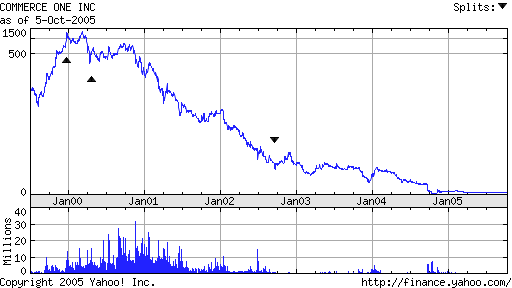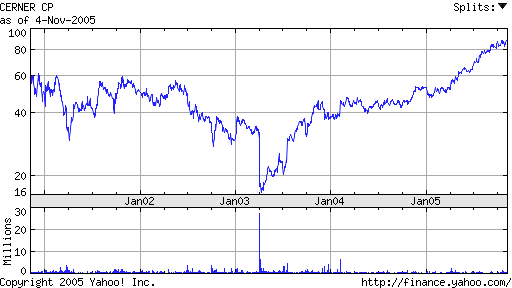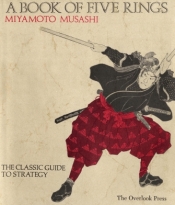Stock market skeletons
I'm airing out my closet.

On my father's 64th birthday, a painful legacy was put to rest. This is the final liquidation dividend from the first and worst stock trade of my life: Commerce One. Yes, that's right, a whopping $.33 -- just short of a phone call. Now really, this investment was done long ago, but I've kept it all these years as a reminder. I held till the bitter end. I'm hoping that in time its lessons will eventually absolve my loss, and for this reason, I share them with you.
It all started when I stepped out of a high school physics class to make an impulsive trade using a school phone. (mistake #1)
My dad had gotten the tip from a tech-savvy relative S (mistake #2, 3rd party tips), I had read up on their prospectus (mistake #3, hype), and at some point during a lecture on frictional coefficients, I decided I was ready to bite. I didn't wait. I stood up in my chair, asked my teacher if I could use the phone in the lab and made an urgent $40 phone brokerage order (#4, duh). Never mind that I'd never had a conversation with an adult regarding investments in my life. If I could create a Roth IRA, I could well invest my retirement. I heard S had picked a lot of winners, I knew technology, liked the company, and the market was booming; this would be as good a start as any.
And so it was, along with software.com/phone.com, OpenWave, and nVidia that my Commerce One stock rode the bubble to new bounds and several multiples of its value.
As the bubble descended on all of them, I spoke with my dad about selling. He explained that wise investors didn't get bothered over market convulsions, and instead, they hold on for their planned investment duration, or in this case three years. Everything tends to 15% in the long run.
Apparently, he hadn't been told about tech stocks. I held on and stomached the mounting thousand dollar losses with disillusionment as the bubble burst. Looking back, with MBA in hand, and 6 additional years of amateur investment experience, I can barely grasp my logic. The picture below describes my folly better than words.
(note logarithmic scale)

I never sold. Ever.
Advice #1: Only a gambler makes impulse stock purchases. Only a fool fails to notice when he has lost such a gamble. Only a genuinely apathetic man should neglect to have a downside limit. Gambling is fun, but if you're not in a financial position to do it, don't.
The sad truth is that I was a gutless gambler, unable to confront reality. Was it ego, misplaced trust, fear of failure, naivety, wishful thinking? It's hard to say, but lesson learned. As a high-schooler I lost denominations in the tens of thousands, which, though abstract and far away in retirement land, still hurt. Downside is real. Sometimes volatility never comes back.
Advice #2: Test your theories on real market data but with fake money. Pretend to make trades and follow stocks to see if they work out. Look at failures and crashes from the past. Read books. Do anything but learn your lessons risking your retirement. Don't let yourself be fooled one day at a time. Keep the broader picture in mind.
Before you hear my "sell x% when it goes down y%" theory, or my "avoid high volatility and positively correlated stocks" methodology, let's take a look at the next high-stakes trade I made, and why it was the same, yet different.

I bought Cerner at 16 and some change with a limit order. I think you can see about where that goes on the graph.
So what lesson did I learn? Obviously, it wasn't avoiding technology stocks, high beta, or falling prices. Instead, the following is what I claim to have learned:
Advice #3: You should not invest in stocks that you don't have the insight, resources, and copious spare time to know everything about. To do so is gambling. Index funds and other diversified financial vehicles are more appropriate for this commitment level. Hedge your risk, don't delude yourself, don't be a retard.
At the time, I was preparing to work at Cerner, and didn't have much better to do. I had spent hundreds of hours researching the company and its market position to impress management. I knew the company's valuation, and more importantly, I knew exactly why it fell, and why it was headed back up. I knew that many of the original investors and major share holders were doctors at the medical center. I knew that the hospital was Cerner's flagship software installation. I knew the hospital was just bought out, and was switching to rival software from Meditech. I knew from my mother that there was an air of panic about the hospital and a great deal of unfounded speculation going on with the physicians. Most importantly, I knew the company was in good long-term shape. In short, I wasn't gambling; this was a strategic bet.
That sealed it, I decided that anything under 17 was a damn good price, and I set a 30-day limit order to buy if it hit that mark. If I couldn't get it for that price, I was only out the cost of an online order. If I could get it for that, it was a steal.
And it was. It came through the next day.
While I was at Cerner, I kept abreast of their UK health care deals, and I kept my stock. About a year later, after I had left the company, I grew weary of staying in the intel loop, and the company reached what I viewed as a reasonable valuation. I wanted to lock in my gains, so I sold my shares for a near 4x return. Looking back, I should have held on to them, but at that point, it had become pure uneducated speculation. I wasn't willing to invest the time to do it right, and frankly, I shouldn't have --- I didn't have enough capital working for me to justify the time I spent. (Though disturbingly, my retirement earnings were approaching my salary at the time).
It's easy to get excited about a big win like this, but you can't. To do so would be to make the egotistical mistake that I made with Commerce One. To have the belief that Cerner would always go up, or to maintain the belief that I didn't need to have knowledge to keep a wise investment would have meant a lesson ignored.
I am a pretty safe investor these days. My heart isn't in it. It doesn't excite me like starting a company. I stay out of trouble, I hedge market, currency, and interest rate risk, and I don't make large bets unless I have good reason. I still make small bets for fun and the occasional macro play, but I collect my earnings, cut my losses, and mostly, I ignore the market altogether. I read the WSJ, and that's it. In general, it's a waste of time and of life energy. If you don't have a lot of money, and don't want to commit the effort required to do it right, I suggest you don't do it at all.
Lesson learned: If you want to gamble, find a way that doesn't involve your retirement.
That's my opinion anyhow.
Side Note: Two summers ago, (back when my Commerce One stock was worth about $3), I was having lunch with Sandy, CEO of Perfect Commerce. I was discussing the use of Commerce One's Doc-Soap XML Data binding tooling in Allied Strategy's Web Services framework. Ironically, I was then using software open-sourced by the company I had a history with (Allied Strategy has since deprecated this for products from BEA and Apache). I knew Sandy had just purchased and stripped out most of what I saw as the remaining value from Commerce One through a series of IP and product acquisitions on the cheap -- what I did not know, is that Sandy kept something of a secret as well. He too held a bit of Commerce One stock in his account, just to give memory to the pain -- to keep the lesson fresh.
Perhaps he was just being nice, but to this day, I feel a little vindicated by it. So much so, I bought him a cigar. Sometimes, its the little things.
Update: Feb 2006 - Sandy outright bought the remainder of Commerce One for what I am guessing amounts to 1/100 of 1% of their 2000 valuation. A class action was filed over the IPO.
 Wednesday, October 19, 2005 at 10:23PM
Wednesday, October 19, 2005 at 10:23PM 
